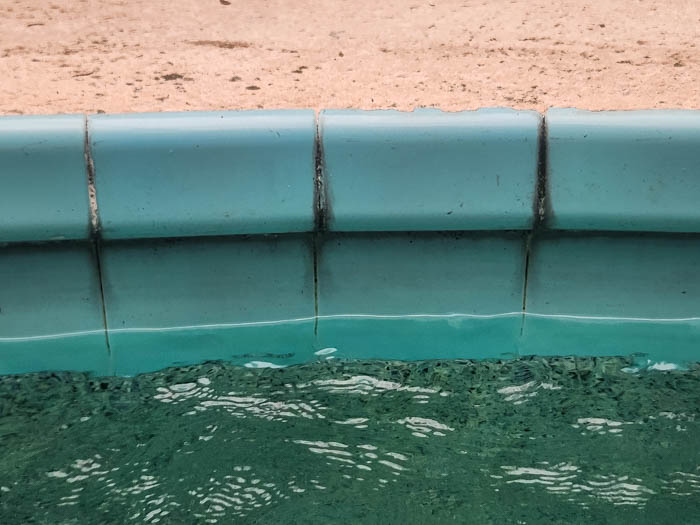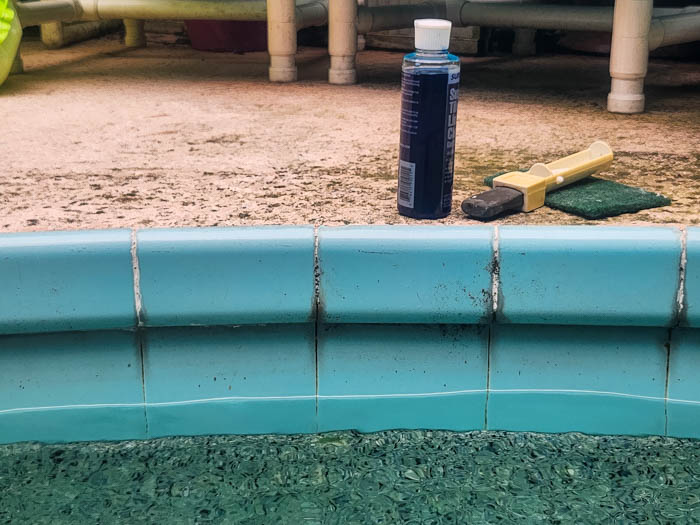Are you wondering how to clean your tiles or what to use for cleaning? Waterline pool tiles can have white calcium buildup, scum, dirt, and stains on them.
Recently I cleaned my pool’s tiles and put together this article to explain why pool tiles get dirty and the best tools and cleaning products for the job.

Article Contents
Our Top 6 Pool Tile Cleaners
1. Bio-Dex #300 (Best Overall)
2. CLR Pro Industrial (For Calcium)
3. Bright Bay Guardian (For Glass Tiles)
4. Clean-EEZ Grout Cleaner (For Grout)
6. Holikme Pad Drill Attachment
Pool Tile Cleaning Products Compared
| Image | Product | Features | Link |
|---|---|---|---|
Best Overall  |
| 9.7 | Check Price |
For Calcium  |
| 9.5 | Check Price |
For Glass Tiles  |
| 9.1 | Check Price |
For Grout  |
| 8.8 | Check Price |
 |
| 8.6 | Check Price |
 |
| 8.2 | Check Price |
What Will Pool Tile Cleaners Remove?
Pool tiles accumulate dirt, grime, and debris from a variety of sources: trees, fertilizers, pollen, and anything that gets into the pool that doesn’t get filtered out. The pool’s circulation will cause floating debris to stick to the tiles.
Loose debris can be eliminated quickly with brushing, and the debris will filter out if the system is running. However, you will need a commercial cleaner and a pumice stone if there are hard-to-remove stains. The question is, what type of cleaner should you use? Fortunately (sort of), I just had to clean some really stained tiles, and here is what I found.
Pool tile cleaners are meant to clean specific things. Unless you know for certain that it is algae or mold, I would use an industrial cleaner like Bio-Dex. I haven’t come across a stain yet that Bio-Dex won’t eliminate. So, if you’re unsure what kind of cleaner to use, start with that.
If you’re looking for an article on how to clean your tiles, I recently wrote an article on this when I cleaned my pool tiles.
Why Do Pool Tiles Get Dirty?
Pool tiles get clean because the pool circulates water through the filter, but not all debris can be filtered out. For instance, pollen is lightweight and gets blown about by the wind. If it gets into your pool, it floats, making it hard for it to circulate. The pollen will stick to the waterline tiles as the water level rises and falls with the circulation.
Another thing that pool tiles get dirty with is mold and algae. Mold and algae cling to surfaces, and if any of them reaches the tiles, they will stick.
Calcium or scale also tends to build up on pool tiles, particularly saltwater pools. It is more frequent when the pH is higher (this happens a lot with saltwater pools) and the water is heated.
There are general cleaners and specialized cleaners, but with a little elbow grease, you can resolve the issue rather quickly. Besides, you can hang out in a pool raft while you clean the tiles. Not a bad day’s work.
Types of Pool Tile Cleaners & Tools

Generally speaking, two types of pool tile cleaners are chemical and manual. Chemicals consist of all-purpose or specialty cleaners like for algae or calcium buildup. There are also tile grout cleaners.
Manual cleaners include pumice stones, sponges, bead blasting, and scouring pads. Which one you choose depends on the type of tile you have. Some tiles are more resistant to scratches than others, which decides which manual cleaner you use. Even if you use a chemical cleaner, you must still clean the tiles with a manual tool. The chemical will loosen the dirt and make it easier to scrub off.
What To Look For In a Pool Tile Cleaner
There are some things to consider when looking for a pool tile cleaner. If the tiles have some loose debris, splashing them with pool water and wiping them down or a quick scrub with a brush will be sufficient to clean them.
If the tiles have deeper stains that need more in-depth cleaning, like calcium build-up, mold, or algae, they will require a commercial cleaner and/or manual tools.
What type of tile you have is also a factor in which cleaner you get. Before you spend money on a commercial tile cleaner, try rubbing the tile with a wet scouring pad. If that doesn’t work, try mixing a little white vinegar with water and scrubbing.
If that doesn’t do the trick, here are some things to consider before purchasing a commercial cleaner and/or tool:
What type of tile do you have?
For instance, if you have glass tile, you want to use a non-abrasive cleaner and a soft-bristled brush. You can use a more aggressive cleaning approach if you have porcelain or ceramic tile.
What type of staining do you have?
If you have loose debris or dirt, a simple washing will work. However, if you have a specific problem like calcium, you should use a calcium cleaner like CLR or a multi-purpose cleaner like Bio-Dex.
Does your grout need cleaning?
Grout cleaning is more specialized than tile cleaning because it’s concrete and hard to reach. You will need a pressure washer, a fine bristle brush, and a commercial grout cleaner like Clean-EEZ.
Best Pool Tile Cleaners Reviewed
1. Best Overall: Bio-Dex #300
- Professional strength tile cleaner
- Softens scale & calcium deposits
- Dissolves oils, lotions, grease
Bio-Dex #300 is a professional-grade multipurpose cleaner that softens scale and makes cleaning easier. You can apply Bio Dex with a scouring pad if the stains are light. If the stains are set in, you can use a pumice stone but only apply light pressure.
- Super strong cleaner
- Handles all types of stains
- Doesn’t clean grout so well
2. For Calcium: CLR Pro Industrial
- Breaks down calcium, lime, and soap scum
- Fast acting
- Suitable for ceramic, glass, stainless steel and metal
CLR Pro Industrial is a quick remover for calcium, rust, and lime deposits. It cleans tile quickly and also adds shine. Even though it is harsh on stains, it is EPA-friendly and won’t affect the chemistry makeup of your pool. Overall, it is a great cleaner that I recommend based on proven results.
- Fast acting
- Won’t affect the pool chemical balance
- Industrial strength
- Could be harmful to skin if not wearing gloves
3. For Glass Tiles: Bright Bay Guardian
- Removes scale, calcium deposits, and scum
- Non-corrosive
- Will not affect pool chemistry
Bright Bay Guardian is known to be tough on tile stains yet safe enough for glass tile. It’s best to use with a sponge or green scouring pad. If you have to use a brush, make sure it’s nylon. Glass tile isn’t as sensitive as some may think, but it’s always best to err on caution. This tile cleaner is strong enough to use without a pumice stone under most circumstances. It is best to use if you have a major scale buildup. It is EPA-safe and will not alter your pool chemistry.
- Soft on skin
- Tough on scale build-up
- Not good for organic stains
4. For Grout: Clean-EEZ Grout Cleaner
- Removes grease, dirt, and stains
- V-shaped grout brush
- Used by professionals
Clean-EEZ Grout Cleaner is one of the best grout cleaners on the market today. It can remove any type of stain from grease, organic, and sediment from all types of grout. It doesn’t matter what type of tile you have; this grout cleaner will do the job. This is also the number one cleaner for professionals, so you know it works well.
- Commercial grade
- Safe for all pool tile types
- The dual pack includes a cleaning brush
- Takes a while to set in before you can start cleaning
- Sometimes takes more than one coat to clean
5. Sepetrel Pool Brush
- Curved edge design
- Covera larger area
- Reinforced aluminum handle
No matter what cleaner you use to clean your pool tile, you will need some kind of manual scrubber. This could be a pumice stone, scouring pad, or a pool brush. If you are using a pool brush, I recommend Sepetrel Pool Brush. It’s affordable, reliable, and mostly flat. A flat brush will enable you to clean more area at once, but this brush is curved just enough to handle the corners. Basically, if you need to clean your tiles without getting into the water, this is your best bet.
- Easy to see if you're brushing algae or mold
- Nylon bristles
- Affordable
- Does not include a telescoping pole
6. Holikme Pad Drill Attachment
- 22-piece drilling attachment set
- Nylon bristles
- Attaches to any cordless drill or impact driver
As a professional pool tile and boat bottom cleaner, I can attest to how well a cleaning drill attachment works. Frankly, I love them. Granted, I clean multiple pools and boat hulls weekly, and maybe you don’t need one for random cleaning. But chemicals and sweat equity save a lot of time and money.
I use a battery-operated Dewalt drill with waterproof battery housing. Mine has lasted two years so far with no issues. The stubbornness of the stain and the material you are cleaning will determine what scrubbing pad you use (the instructions will fill you in). You don’t need to apply any pressure, simply lock the trigger in the “go” position and let the drill do the work for you.
I have actually cleaned hard calcium stains off of pool tiles and hardened barnacles off of boat hulls without the use of scraping or chemicals. The biggest benefit for pool owners is that you don’t add chemicals to your pool water. Plus, power tools are fun!
The Holikme Pad Drill Attachment is a great set for under $20. It comes with 22 pieces and will have the pad you need to scrub your tiles. Sometimes it takes trying out different pads to clean whatever you’re trying to clean effectively, and this set gives you all the options, so it’s a safe bet.
- Saves time & effort
- Easiest way to clean off heavy deposits like calcium
- Affordable
- Need to have a drill & can’t get the drill wet
Bead Blasting
If you have difficulty removing calcium and mineral deposits from pool tiles, you may consider hiring a pro to bead blast your tiles. Bead blasting is a method of cleaning pool tiles used by professionals.
This process uses glass beads or crushed glass sprayed at high pressure onto the tiles. It’s similar to a sandblaster but without as much mess. You’re likely to pay $350-$500 for a small pool to have this done.

